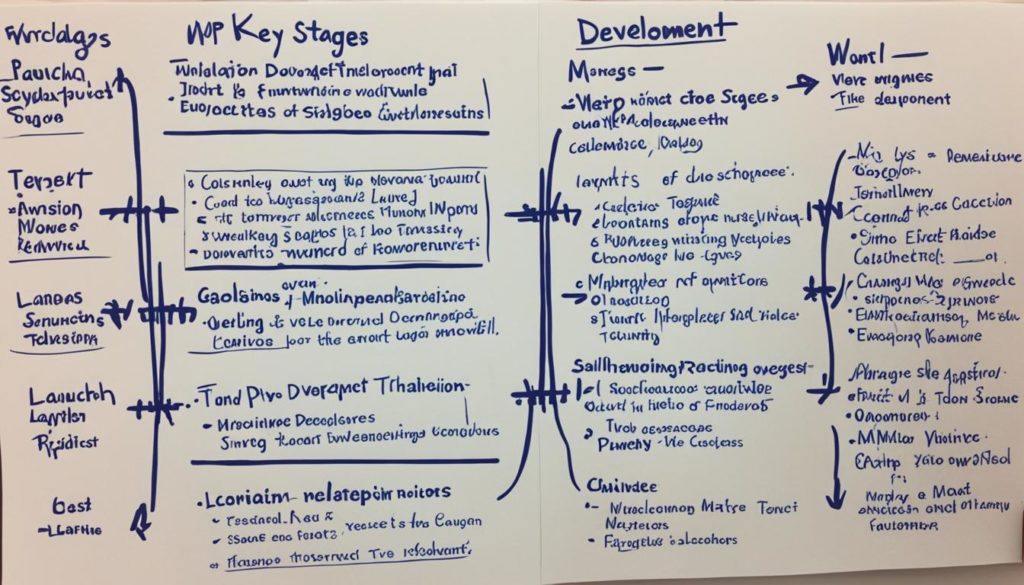
Did you know only about 79.4% of companies make it past their first year? This fact shows how tough it is to start a business. It also shows why planning is so important. As entrepreneurs, we want to make our dreams come true. Knowing how to start a business is crucial for success.
This guide will help you through every step for starting a company. From coming up with your idea to growing your business, we’ve got you covered. It’s all about turning your vision into reality.
Key Takeaways
- Startup costs vary based on the type and scale of the venture.
- Small businesses play a crucial role in new business creation across industries.
- A robust business plan is vital for investors and internal management.
- Conduct primary research to understand your market needs.
- Evaluate your business idea’s viability using SWOT analysis.
- Develop a comprehensive marketing plan to identify competition and targets.
- Financial planning, including budgeting and projections, is crucial for sustained growth.
Get in the Right Mindset for Entrepreneurship
Getting the right mindset for entrepreneurship is key to starting a business. Over 30% of American adults want to be their own boss. But, this change requires a big mindset shift and staying determined.
Embrace the Mindset Shift
Going from an employee to an entrepreneur is a big change. Almost 40% of small business owners say self-discipline is key. It’s about moving from a set routine to handling big responsibilities and unknowns.
Entrepreneurs need to be flexible, adaptable, and proactive. They must tackle challenges head-on.
Stay Consistent and Motivated
Staying motivated can be tough, especially when the excitement fades. It’s important to keep working hard. Set clear, achievable goals to stay on track.
Also, celebrate small wins. This helps keep you motivated and moving forward.
Take the Next Step Boldly
After embracing the business mindset shift, it’s time for bold steps. Entrepreneurs should not be afraid to make big decisions. This could mean launching a new product or expanding into new markets.
Being bold drives growth and pushes the business to new levels.
Finding and Validating Your Business Idea
Starting a successful business begins with a strong idea. This idea must match market needs and your personal strengths. Let’s look at the steps to find and validate your business idea.
Determine Your Business Concept
Every successful business starts with a solid idea. Your idea should connect with potential customers. For example, Casper’s founders in 2014 looked closely at the mattress market.
They checked the market size, what made their product different, and how e-commerce was growing. This helped them create something unique.
Research Your Competitors and Market
Doing deep market research is key to validating your idea. You need to know your competitors well and understand the market. For example, “foam mattress” gets over 11,500 searches a month.
Looking into specific searches, like “best mattress for lower back pain sufferers,” shows you can find your niche. This niche can be a big opportunity.
Conduct a SWOT Analysis
A SWOT analysis helps you see your business’s strengths, weaknesses, opportunities, and threats. It guides you in making smart decisions and planning strategies. For example, analyzing beta testing feedback can show you what to improve.
This analysis helps you use your strengths, reduce risks, and find new chances. It’s a powerful tool for planning your business.
Engage Your Target Audience
Talking to your target audience early is crucial. You can do this through customer interviews and beta testing. These methods give you insights on how to improve your product and meet market needs.
By listening to your audience, you build early relationships and loyalty. This way, you can create a product that truly meets what people want.
Developing a Solid Business Plan
Creating a solid business plan is crucial for any new business. Our guide will show you the key parts to focus on. This will help you make a great business plan.
Executive Summary and Mission Statement
Your business plan should start with a strong executive summary. It should capture the essence of your business. Include your mission statement, which shows your company’s purpose and future goals.
Working with experts can help make this section stand out. It will catch the eye of potential investors.
Market Analysis and Competitor Review
Understanding the market is vital in your business plan. It helps you see the market size, compare to others, and find your unique selling point. A SWOT analysis can reveal your strengths, weaknesses, opportunities, and threats.
Use government stats, industry groups, and academic studies for research. They are great resources for this part.
Financial Planning and Projections
Good financial planning is key to knowing your business’s financial health. It involves setting budgets for different time frames and costs like rent and marketing. Your financial projections should include revenue and profit goals, and how you plan to invest.
Remember to plan for unexpected costs. This will help you avoid surprises later. For more on financial planning, check out this link.
Marketing and Sales Strategies
Creating strong marketing and sales plans is essential. They help you reach and grow your customer base. Outline your promotional plans, pricing, and sales strategies for your audience.
By including these in your plan, you set a strong base for growth.
Steps to Launching a Company
Starting a company takes several key steps for a solid base. From registering a business with the state to having an online presence, each step is crucial for lasting success.
Register Your Business
Registering your business with the Secretary of State is a first step. It makes your business a legal entity under state laws. You must pick the right structure, like LLC, corporation, or sole proprietorship. This choice impacts your operations, taxes, and personal liability.
Obtain Necessary Licenses and Permits
Getting the right business licenses and permits is key for legal standing. It ensures your business follows local, state, and federal rules. The Oklahoma Business Hub offers great resources for understanding the needs of different industries.
Set Up Business Bank Accounts
Having separate business bank accounts is essential for good finance management. It helps track expenses, receive payments, and keeps personal and business finances separate. It also aids in getting business credit cards and loans, which often require a year of operation.
Establish Your Business Presence Online
In today’s digital world, a strong online business presence is crucial. A professional website and active social media profiles boost your visibility and customer engagement. Many start their online presence early to reach their audience and handle online sales, even with higher fees than in-person payments.
For a detailed guide, including tips on business ideas, market research, and names, visit the Oklahoma Business Hub. It covers 11 key steps to start your business efficiently.
Managing Finances and Funding
Effective financial management is key for a business to thrive. A realistic budget helps control spending and use resources wisely. Looking into loans, investor funding, or grants can bring in the money needed for growth. It’s also smart to keep personal and business money separate to avoid legal and tax problems.
Create and Stick to a Budget
Starting a budget is a basic step in managing money. It helps us plan for expenses like licenses, equipment, and marketing. As a business grows, so do costs like salaries and office space. Knowing how to make financial statements is also important.
Explore Funding Options
There are many business funding options to choose from. Each has its own benefits and risks. Here are a few:
- Self-funding: Gives you full control but can use up your savings.
- Crowdfunding: Uses platforms to get support from backers.
- Small business loans: Requires a detailed plan and financial projections.
- Venture capital: Brings in a lot of money but means giving up some control.
Facebook’s growth shows how important the right funding can be. It went from a small angel investment to a big venture capitalist deal in just a year.
Separate Personal and Business Finances
Keeping personal and business money separate is vital. It makes things clear and protects your personal assets. This helps avoid legal and tax problems.
Understanding budgeting, finding the right funding, and separating personal and business money are key. These steps help build a strong financial base for your business.
Conclusion
Starting a business is both exciting and tough. It takes passion, careful planning, and hard work to succeed. We’ve talked about key things for lasting success, like the right mindset and good finance management. Keeping accurate financial records is also vital for your journey.
A solid business plan is a big help. It guides you at the start and helps attract investors. It shows how much money you need, your financial outlook, and what makes you stand out. Your plan should show your strengths and your goals, backed by data and visuals.
Good finance management is more than just budgeting. It’s about keeping detailed records and keeping personal and business money separate. This helps avoid problems and helps your business grow. For entrepreneurs, always keep learning and adapting to stay ahead.
To sum up, success in business comes from careful planning, watching your finances closely, and being ready to change. By following these strategies and keeping detailed records, you can greatly increase your chances of lasting success. For more tips on why your business will succeed, read this helpful article.
FAQ
What are the first steps to starting a company?
First, you need a profitable business idea. Then, do market research and a SWOT analysis. This makes sure your idea fits the market.
How do we embrace the right mindset for entrepreneurship?
You need a versatile and proactive mindset. It’s a big change from being an employee. Keep trying hard and stay motivated.
What is the importance of a business plan?
A business plan is like a roadmap. It starts with a strong summary and mission statement. Then, it covers market analysis, finances, and marketing strategies.
How do we validate our business idea?
Validate your idea by knowing your concept and researching the market. Do a SWOT analysis and talk to your target audience.
What are the necessary steps to launch a company?
To launch, register your business and get licenses. Open business bank accounts and create a website and social media.
How can we manage finances and explore funding options efficiently?
Manage finances with a budget and explore funding like loans or grants. Keep personal and business money separate.
How do we ensure our business stays motivated and growth-oriented?
Stay motivated by setting goals and taking action. Learn and adapt as your business grows. This keeps it successful and growing.
What strategies can enhance our chances of business success?
A strong business plan and good finance management are key. Adapt to challenges and understand the market and competitors. This ensures your business grows and stays strong.
Future App Studios is an award-winning software development & outsourcing company. Our team of experts is ready to craft the solution your company needs.










